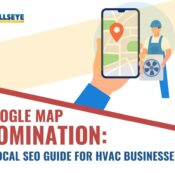

How to Start and Successfully Run Your Own HVAC Business in 2025

Starting your own HVAC business in 2025 can be an incredibly rewarding venture. With the growing demand for heating, ventilation, and air conditioning services, the HVAC industry offers substantial opportunities for entrepreneurs ready to take the plunge. However, success in this field requires more than just technical skills; it calls for solid business planning, strategic marketing, and efficient operations.
Call Now For The Expert Digital Marketing Solutions: 561-277-0148
We understand the unique challenges and opportunities faced by HVAC entrepreneurs. In this comprehensive guide, we’ll walk you through the essential steps to start and successfully run your own HVAC business, from crafting a business plan for your HVAC company to understand start-up costs and business models.
Understanding the HVAC Business Landscape in 2025
Before diving into starting your HVAC company, it’s crucial to get familiar with the industry landscape. The HVAC business is evolving, driven by technological advancements, environmental regulations, and changing consumer preferences. Customers today look for energy-efficient systems, smart HVAC solutions, and reliable service providers.
Key trends shaping the HVAC industry:
- Increased demand for eco-friendly and energy-efficient systems
- Growing commercial and residential construction fueling new demand
- Smart HVAC technology integration
- Emphasis on maintenance and repair services alongside installation
Understanding these trends will help shape your HVAC business model and position you to capture emerging market opportunities.
Crafting a Strong HVAC Business Plan
One of the first steps in starting an HVAC business is developing a detailed HVAC business plan. This plan serves as a roadmap, helping you define your goals, strategies, and financial projections.
What your HVAC business plan should include:
- Executive Summary: Overview of your HVAC business idea and goals.
- Market Analysis: Understanding your target market, competition, and customer needs.
- Services Offered: Whether installation, maintenance, repair, or a mix.
- Business Structure: Sole proprietorship, LLC, or corporation – each has tax and liability implications.
- Marketing and Sales Strategy: How you plan to attract and retain clients.
- Operational Plan: Equipment, staffing, suppliers, and day-to-day workflow.
- Financial Plan: Start-up costs, projected revenue, profit margins, and break-even analysis.
A well-thought-out business plan for HVAC companies not only guides your strategy but is also essential when seeking funding or partnerships.
Key Steps to Starting Your Own HVAC Business
Starting an HVAC business involves several critical steps that ensure a strong foundation and legal compliance.
1. Obtain Proper Licensing and Certifications
HVAC is a regulated industry, and starting your HVAC company means meeting licensing requirements that vary by state and locality. Certification from recognized organizations (like EPA Section 608 certification) is often mandatory. Compliance builds trust and credibility with clients.
2. Invest in Training and Learning HVAC Skills
Even if you already have HVAC experience, continuous learning is vital. Technologies evolve, so learning HVAC trends, system types, and troubleshooting techniques will keep your skills sharp and relevant.
3. Develop Your HVAC Business Structure
Choosing the right business structure affects taxes, liability, and operations. Many HVAC entrepreneurs choose LLCs for liability protection and tax flexibility. Consult with legal and financial advisors to find the best fit for your HVAC business.
4. Calculate HVAC Business Start-Up Costs
Understanding your start-up costs is crucial for budgeting and securing financing. Typical HVAC start-up costs include:
- Licensing and certification fees
- Tools and equipment
- Vehicles and transportation
- Insurance and bonding
- Marketing and branding
- Staff salaries or subcontractor fees
- Office or warehouse space (if needed)
We recommend detailed cost analysis to avoid surprises and plan sustainable growth.
5. Secure Financing
Whether self-funded or through loans, having a clear financial plan is essential. Explore options like SBA loans, equipment financing, or investor partnerships. A solid HVAC business plan will strengthen your case.
Marketing Your HVAC Business in a Competitive Market
Running an HVAC business today demands a strong marketing presence. Potential customers often begin their search online, so your HVAC marketing strategy must focus on digital channels.
Effective HVAC marketing strategies include:
- Professional Website: A mobile-friendly site showcasing services, certifications, and contact info.
- Local SEO: Optimize for “hvac business near me,” “starting an HVAC company in [your city],” and other relevant keywords to capture local leads.
- Google Business Profile: Claim and optimize your profile to appear in local searches and maps.
- Social Media Marketing: Share tips, promotions, and project photos on platforms like Facebook and Instagram.
- Online Reviews: Encourage satisfied customers to leave reviews to boost credibility.
- Email Marketing: Regular updates and maintenance reminders to existing customers.
- Referral Programs: Reward customers who refer new clients to grow your base organically.
Bullseye Marketing Consultants can assist HVAC businesses with targeted marketing plans that maximize ROI and boost brand visibility.
Building an Efficient HVAC Business Model
To succeed long-term, focus on creating an efficient HVAC business model that balances profitability with customer satisfaction.
Elements of a successful HVAC business model:
- Diverse Service Offerings: Combine installation, repair, and maintenance to create multiple revenue streams.
- Transparent Pricing: Clear, competitive pricing builds trust and reduces disputes.
- Quality Customer Service: Fast response times and friendly staff encourage repeat business.
- Operational Efficiency: Use software tools for scheduling, billing, and inventory management.
- Skilled Workforce: Invest in training technicians to deliver top-notch service.
- Sustainability Focus: Offer eco-friendly HVAC solutions to attract environmentally conscious clients.
Managing the Challenges of Running an HVAC Business
Like any business, owning an HVAC business comes with challenges—from fluctuating demand to rising costs. Being prepared helps you adapt quickly.
Common challenges and solutions:
- Seasonal Demand Fluctuations: Offer maintenance contracts to stabilize revenue year-round.
- Skilled Labor Shortage: Partner with training schools and offer apprenticeships to build talent pipelines.
- Competition: Differentiate your services through specialized skills or green HVAC solutions.
- Cash Flow Management: Use accurate invoicing and payment systems to maintain steady cash flow.
Final Thoughts
Starting a successful HVAC business in 2025 is entirely achievable with careful planning and execution. Focus on learning HVAC fundamentals, crafting a comprehensive business plan, understanding start-up costs, and building an effective marketing strategy.
We specialize in supporting HVAC entrepreneurs with proven marketing strategies, business insights, and growth tools. Whether you’re just starting your HVAC start-up or looking to expand an existing company, the right guidance makes all the difference.
Call To Action
Ready to turn your HVAC business dreams into reality? Begin with a solid plan, commit to learning, and invest in smart marketing. Success is within reach for those willing to take the first step.
5 Best FAQs About Starting and Running an HVAC Business
1. How much does it cost to start an HVAC business in 2025?
The HVAC business start-up cost typically ranges from $10,000 to $50,000, depending on equipment, licensing, vehicles, and marketing investments.
2. Do I need a license to start an HVAC company?
Yes, most states require proper HVAC licensing and certifications (such as EPA Section 608) to legally operate and ensure compliance with regulations.
3. What services should I offer when starting an HVAC business?
Popular services include installation, repair, and maintenance of heating and cooling systems. Offering energy-efficient and smart HVAC solutions can set you apart.
4. How can I market my HVAC business effectively?
Invest in a professional website, optimize for local SEO, use social media, and encourage customer reviews. Marketing experts like marketing consultants can help drive leads.
5. Is owning an HVAC business profitable?
Yes, with strong planning, skilled technicians, and efficient operations, running an HVAC business can be highly profitable, especially as demand for HVAC services continues to grow.




